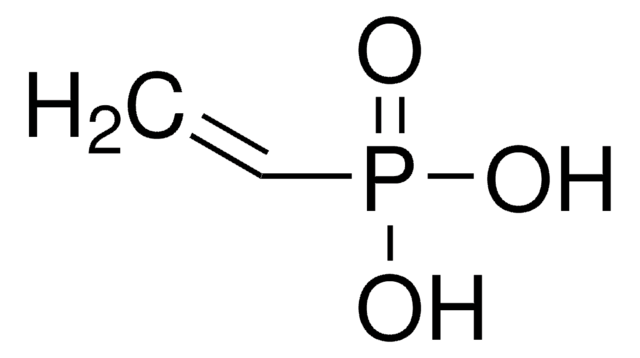439606
Diallyl N,N-diisopropylphosphoramidite
Synonym(s):
N,N-Bis(1-methylethyl)phosphoramidous acid di-2-propenyl ester, Diallyloxy(diisopropylamino)phosphine
About This Item
Recommended Products
form
liquid
refractive index
n20/D 1.456 (lit.)
bp
130 °C (lit.)
density
0.928 g/mL at 25 °C (lit.)
storage temp.
2-8°C
SMILES string
CC(C)N(C(C)C)P(OCC=C)OCC=C
InChI
1S/C12H24NO2P/c1-7-9-14-16(15-10-8-2)13(11(3)4)12(5)6/h7-8,11-12H,1-2,9-10H2,3-6H3
InChI key
QBLCHHSGJTUNSJ-UHFFFAOYSA-N
Looking for similar products? Visit Product Comparison Guide
Application
- Preparation of peptide substrates.
- Preparation of rhodamine dyes with phosphorylated CH2OH sites.
- Synthesis of 3-[4-(bis-allyloxy-phosphoryloxy)-2(R)-hydroxy-3,3-dimethyl-butyrylamino]-thiopropionic acid-S-propylester.
- Selective orally active S1P1 agonists
- Water-soluble prodrugs of triazole CS-758 with antifungal activity
- Fostriecin analogs as antitumor agents
Reactant involved in:
- Phosphitylation of alcohols
- Deallylation for the synthesis of nucleoside phosphoramidite
- Posphitylation and stereoselective Pudovik rearrangement
Signal Word
Warning
Hazard Statements
Precautionary Statements
Hazard Classifications
Eye Irrit. 2 - Flam. Liq. 3 - Skin Irrit. 2 - STOT SE 3
Target Organs
Respiratory system
Storage Class Code
3 - Flammable liquids
WGK
WGK 3
Flash Point(F)
89.6 °F - closed cup
Flash Point(C)
32 °C - closed cup
Personal Protective Equipment
Regulatory Listings
Regulatory Listings are mainly provided for chemical products. Only limited information can be provided here for non-chemical products. No entry means none of the components are listed. It is the user’s obligation to ensure the safe and legal use of the product.
FSL
Group 4: Flammable liquids
Type 2 petroleums
Hazardous rank III
Water insoluble liquid
JAN Code
439606-VAR:
439606-1G:
439606-BULK:
439606-250MG:
Certificates of Analysis (COA)
Search for Certificates of Analysis (COA) by entering the products Lot/Batch Number. Lot and Batch Numbers can be found on a product’s label following the words ‘Lot’ or ‘Batch’.
Already Own This Product?
Find documentation for the products that you have recently purchased in the Document Library.
Customers Also Viewed
Our team of scientists has experience in all areas of research including Life Science, Material Science, Chemical Synthesis, Chromatography, Analytical and many others.
Contact Technical Service











